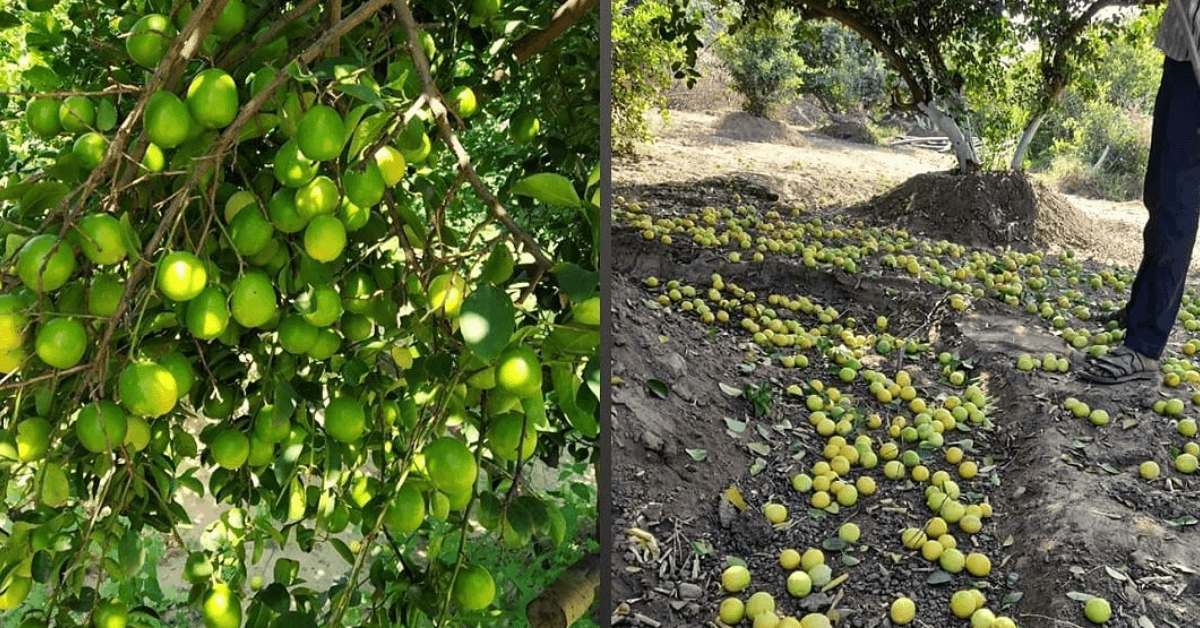Lemon Farming : Commercially-grown lemons are a popular, long-running and lucrative enterprise in many countries across the globe. A lot of people are already in this commercially to make profits.
Lemon is an important fruit that is widely used throughout the world. it is most well-known for its juice and pulp across the globe. It’s an excellent business to make money fast.
Lemon (Citrus Limon) is a tiny evergreen tree belonging to the family of flowering plants Rutaceae indigenous in Asia (primarily Assam, Northeast India), Northern Myanmar or China.
The fruit of the tree’s ellipsoidal yellow is referred to as lemon. The fruit is utilized to cook and for other purposes all over the world. It is primarily used for its juice, which is used for both cooking and cleaning applications. Both the pulp and the rind are employed in baking and cooking.
The lemon’s juice is around 5% to 6% citric acid having a pH of 2.2 which gives it a sour flavour. The distinct sour flavour from lemon juice is a crucial ingredient in food and drinks like lemonade or meringue pie.
The global production of lemons (combined with limes to report) was 19.4 million tons. The top lemon producers included India, Mexico, China, Argentina, Brazil and Turkey (collectively accounting for about 65% of all production).
But, commercial lemon farming can be an easy and profitable venture. It is possible to start a business quickly and make profits.
Nutritional Value of Lemon
Lemon is extremely nutritious. It is particularly good in vitamin C. 100 grams of lemon juice provides 64% of the Daily Value. Other essential nutrients are not as abundant.
Lemons contain a variety of phytochemicals such as polyphenols, terpenes and Tannis. Lemon juice is slightly higher in citrus acid than lime juice (around 47 grams/litre) more than twice as much citric acid as grapefruit juice. It is also about five times more citric acid in orange juice.
Vitamin C is extremely high in lemon, and the other minerals and vitamins are much less. A 100g serving of lemon juice provides these the following nutrients.
- Energy 29 Kilocalories (121 kJ)
- Carbohydrates: 9.32 grams
- Sugar: 2.5 grams
- Fibre from the diet: 2.5 grams
- The fat: 0.3 gram
- Protein: 1.1 gram
- Vitamin C: 53 mg
Health Benefits of Lemons
They are very nutritious and offer many health advantages. Lemons are extremely rich in Vitamin C fibre, and many beneficial plant substances.
Lemons could help support weight loss, heart health and digestion health. We attempt to explain the health benefits that are most prominent from lemons.
Lemons can help improve heart health since they’re rich in vitamin C, a heart-healthy vitamin, and a variety of beneficial plant compounds that can reduce cholesterol. [2]
- The regular consumption of lemons can help in reducing weight.
- Lemon juice can help keep kidney stones out of the way.
- Lemons, as you may have guessed, are rich in vitamin C as well as citric acid. This helps you absorb non-heme iron from plants, and it can help prevent anaemia.
- Lemon contains beneficial chemical compounds in plants that have been proven to reduce cancer in animals (human studies are required).
- The soluble fibre found in lemons may help improve digestive health. However, to reap this benefit it is necessary to consume all the juice of the lemon not only the juice.
- Lemon water helps to hydrate. Lemon juice enhances the flavour of water and can help you drink more.
- Since lemons contain a high level of Vitamin C. It enhances the quality of your skin. It helps reduce the appearance of wrinkles on the skin, dry skin caused by ageing, and sun damage.
- Lemon water is refreshing for breath.
Advantages of Lemon Farming Business
Lemon farming for commercial purposes is a profitable and easy business. Many are already operating this type of business. It’s simple even for beginners to begin this type of business.
Large-scale or commercial production of lemons is very well-known in a variety of countries to earn money. But, we will try to highlight the most significant advantages of the business of growing lemons.
- Beginning a commercial lemon farming business is easy. It is possible to start the business with ease even if you’re new to the business.
- Planting lemons is easy. The plants are sturdy and robust.
- Commercially-grown lemons are a common industry in certain regions that include India, Myanmar and China.
- A lot of producers have already begun commercial lemon farming. This means that you don’t have to fret about starting a business in this field. It is a great investment with a bright future.
- The commercial lemon industry is extremely profitable. This means that you’ll be able to generate decent profits from this venture.
- It is possible to start your own business even if are new to the business. However, we suggest having some training before starting commercial production.
- Capital requirements are fairly minimal compared to other farming businesses. However, rest assured that the returns are excellent.
- The demand, as well as the value of lemons, are both good on the market. This means that you don’t have to be concerned about marketing your product.
- The care of lemon plants is easy. You’ll have to pay less on taking good care of the plants.
- You could even begin small-scale lemon production and use your vacant land such as a bank of ponds, lakes, etc. In addition, it will provide you with additional cash.
- Commercial lemon farming can be a profitable and lucrative business. Therefore, it is an excellent employment option for those who are unemployed. Particularly for educated, but not employed.
- Lemons are extremely nutritious and can be enjoyed with fresh lemons whenever you set up the production of your own company.
How to Start Lemon Farming Business
Beginning a commercial or large-scale lemon production is simple and easy. You can start your enterprise even if you an aspiring.
We recommend that you have an education or practical experience from farmers you know if you’re an aspiring farmer. We are here to provide more details about starting a commercially farming lemon.
Site Selection
In the beginning, you must choose an ideal location to begin your business of commercial lemon farming. In reality, it is possible to grow lemons on nearly all soil types. Light soil with adequate drainage is perfect to produce it.
The ideal pH range is 5.5 up to 7.5. Plants can also thrive in slightly acidic and alkaline soils. The soils that are light and well-drained are recommended for commercial lemon cultivation.
Land Preparation
Make sure the land is prepared so that plants can flourish effectively. Plough across ploughs, then make sure the soil is level. When planting is required in hilly areas, the planting is carried out on terraces that are against hills in areas of hilliness. The high density of planting is feasible in these areas.
Climate Requirement For Lemon Production
The subtropical climate is most suitable for the growth of lemon plants and development. Temperatures that are below -4 degrees Celsius are dangerous for young plants. A soil temperature of 24deg C – 25deg C is a good range for root development.
Dry climates/conditions with a well-defined summer that has minimal rainfall (ranging from 75cm-250cm) are ideal for the growth of crops.
Varieties/Cultivars
There are numerous varieties of lemons or cultivars that are available around the globe to be used in commercial production. The most well-known and well-known lemon varieties include Bonnie, Eureka, Lisbon, Sorrento, Yen Ben and many more. are the most common varieties which are grown and produced in the United States.
Purchase Seeds/Plants
The lemon plants reproduce by the budding process or through air layering. You can make the plants yourself or buy them from one of the nurseries near you.
Planting
The ideal time to plant lemon trees is between July and August. The Minimum recommended density of plants is 208 plants for each acre.
The spacing between plants must be maintained between 4.5×4.5. Pits measuring 60x60x60cm must be dug to plant seeds. 10kg of Farmyard Manure and 500g of superphosphate single should be sprayed on pits before planting.
Caring
They are robust and durable and generally require less care and management. However, taking extra care will allow the plants to improve their growth and yield more.
Here we will provide information about the most effective care procedure of the plants used for commercial lemon farming businesses.
Fertilizing
They are huge feeders. They require organic as well as chemical fertilizers to ensure better development and the highest production.
Apply cow dung that is well-composed at a rate between 5 and 20 kilograms per plant when the plant is between one to 3 years. Apply Urea at a rate between 100 and 300 grams for each tree.
Apply well-decomposed cow dung in the range between 25 and 50 kg. Urea 100-300 grams per tree if the trees range from 4 to 6 years old. age.
For trees between 7 and 9 years old Apply urea at an amount of 600-800 grams and well-decomposed cow dung in the range of 60-90 kilograms per tree.
Apply about 100 kg of well-digested cowdung for each tree. 800 – 1500 grams Urea for trees with a lifespan of between 10 and 10 years old.
Apply the entire amount of cow dung throughout December, and apply Urea in two portions; apply the first dose in the month of Urea in February, and then the second dose during April-May month. When you apply your first dosage of Urea Apply the entire dose of SSP fertilizer.
Watering/Irrigation
It is essential to regularly water lemons to ensure more growth and better production. The most life-saving irrigation is required during summer and winter. The need for irrigation is vital for flowering and fruiting, as well as for the proper growth of the plant.
However, excessive irrigation can result in diseases such as root rot or Collar rot. The use of high-frequency watering is beneficial.
Mulching
Mulching is extremely beneficial in conserving moisture in the soil and also to manage the growth of weeds. It is possible to use organic materials to mulch.
Weeding
The control of weeds is done by hand-hoeing, and can also be controlled chemically. Utilize glyphosate at a rate of 1.6 1 litre for every 150 litres of water. Make sure to use glyphosate on weeds, not on crops.
Pruning
To ensure proper growth of the trunk of the plant, branches in 50-60 cm near the ground should be cut off. The centre of the plant should remain unobstructed. Water suckers must be removed in the beginning stages of development.
Pests & Diseases
As with other commercial crops, the lemon plant is also vulnerable to a variety of diseases and pests. Common diseases and pests of the lemon plant are Citrus psylla Leaf miner, Scale insect, Aphids, Mealybugs, Citrus canker, Gummosis, Powdery mildew, Blackspot, Lemon scab, Collar rot Zinc deficiency, iron deficiency, etc. Consult an experienced expert within your region If you have any issues.
Harvesting
Harvesting can begin as soon as the fruits reach the proper dimensions, shape, and appealing colour. Based on the variety, fruits are typically ready to harvest in mid-January through mid-February.
The Eureka lemon is a variety that grows all year round and is abundant. It is the most common supermarket lemon, also referred to as “Four Seasons’ (Quatre Saisons) due to its capacity to produce flowers and fruits all year long.
Make sure you harvest at the correct timing, as too early or late harvesting will result in low quality. Clean the fruits after harvesting by using freshwater.
Yield
The yield is usually low in the first few years. It is possible to expect between 50-60 fruits for each tree within their 3 to 4 years of old age. The production increases as trees age, and you can anticipate an excellent harvest from the 8th year of life. The average production is about 700 fruit per tree after stabilization.
Marketing
Marketing lemons is easy. You can offer your goods in your local market or at any grocery store. But, it is important to create an excellent marketing plan before beginning your business.
These are the most common methods and steps to begin and operate an effective lemon farming business. We hope this guide has been of help to you. Best of luck and I pray that God is with you!











